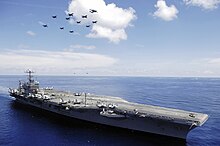
Back سيادة بحرية Arabic Господство по море Bulgarian سەرکردایەتیی دەریا CKB Seeherrschaft German Doctrine de contrôle de la mer French שליטה בים HE Penguasaan laut ID 制海権 Japanese Теңіздегі үстемдік Kazakh Penguasaan laut Malay
This article needs additional citations for verification. (May 2022) |

| Part of a series on |
| War (outline) |
|---|
 |
Command of the sea (also called control of the sea or sea control) is a naval military concept regarding the strength of a particular navy to a specific naval area it controls. A navy has command of the sea when it is so strong that its rivals cannot attack it directly. This dominance may apply to its surrounding waters (i.e., the littoral) or may extend far into the oceans, meaning the country has a blue-water navy. It is the naval equivalent of air supremacy.
With command of the sea, a country (or alliance) can ensure that its own military and merchant ships can move around at will, while its rivals are forced either to stay in port or to try to evade it. It also enables free use of amphibious operations that can expand ground-based strategic options. The British Royal Navy held command of the sea for most of the period between the 18th to the early 20th centuries, allowing Britain and its allies to trade and to move troops and supplies easily in wartime, while its enemies could not. In the post-World War II period, the United States Navy has had command of the sea.
Few navies can operate as blue-water navies, but "many States are converting green-water navies to blue-water navies and this will increase military use of foreign Exclusive Economic Zones [littoral zone to 200 nautical miles (370 km)] with possible repercussions for the EEZ regime."[1]
- ^ Skaridov, Alexander S., Naval activity in the foreign EEZ—the role of terminology in law regime, St. Petersburg Association of the Law of the Sea, 7 Kazanskaya St., St. Petersburg 191186, Russia, Available online 11 November 2004, archived from the original on 17 October 2006